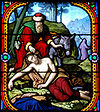- New Wine into Old Wineskins
-
New Wine into Old Wineskins is one of a pair of parables told by Jesus in the New Testament, found in Matthew 9:14-17, Mark 2:21-22, and Luke 5:33-39. A version of the parables also appears in the Gnostic Gospel of Thomas (Saying 47).[1]
Contents
Passage
The parables are told in response to a question about fasting:
And they said unto him, Why do the disciples of John fast often, and make prayers, and likewise the disciples of the Pharisees; but thine eat and drink? And he said unto them, Can ye make the children of the bridechamber fast, while the bridegroom is with them? But the days will come, when the bridegroom shall be taken away from them, and then shall they fast in those days.
— Luke 5:33-35, Authorized King James Version
Jesus' response continues with the two short parables. Luke has the more detailed version:
And he spake also a parable unto them; No man putteth a piece of a new garment upon an old; if otherwise, then both the new maketh a rent, and the piece that was taken out of the new agreeth not with the old. And no man putteth new wine into old bottles; else the new wine will burst the bottles, and be spilled, and the bottles shall perish. But new wine must be put into new bottles; and both are preserved. No man also having drunk old wine straightway desireth new: for he saith, The old is better.
— Luke 5:36-39, Authorized King James Version
Interpretation
The parables follow the recruitment of Matthew as a disciple of Jesus, and appear to be part of a discussion at a banquet held by him (Luke 5:29).[2]
The metaphors in the two parables were drawn from contemporary culture.[3] New cloth had not yet shrunk, so that using new cloth to patch older clothing would result in a tear as it began to shrink.[4] Similarly, old wineskins had been "stretched to the limit"[4] or become brittle[3] as wine had fermented inside them; using them again therefore risked bursting them.[4]
The two parables relate to the relationship between Jesus' teaching and traditional Judaism.[3]
According to some interpreters, Jesus here "pits his own, new way against the old way of the Pharisees and their scribes."[2] In the early second century, Marcion, founder of Marcionism, used the passage to justify a "total separation between the religion that Jesus and Paul espoused and that of the Hebrew Scriptures."[5]
Other interpreters see Luke as giving Christianity roots in Jewish antiquity,[2] although "Jesus has brought something new, and the rituals and traditions of official Judaism cannot contain it."[6]
In his Commentary on Matthew, Mark, and Luke, John Calvin states that the old wineskins and the old garment represent Jesus' disciples, and the new wine and unshrunk cloth represent the practice of fasting twice a week. Fasting this way would be burdensome to the new disciples, and would be more than they could bear.[7]
See also
- New Covenant
- The New Commandment
- Supersessionism
- Biblical law in Christianity
- Split of early Christianity and Judaism
- Abrogation of Old Covenant laws
References
- ^ Gospel of Thomas: Lamb translation and Patterson/Meyer translation.
- ^ a b c Joel B. Green, The Gospel of Luke, Eerdmans, 1997, ISBN 0802823157, pp. 248-250.
- ^ a b c James R. Edwards, The Gospel According to Mark, Eerdmans, 2002, ISBN 0851117783, pp. 91-92.
- ^ a b c Craig S. Keener, A Commentary on the Gospel of Matthew, Eerdmans, 1999, ISBN 0802838219, pp. 300-301.
- ^ Joseph B. Tyson, Marcion and Luke-Acts: A defining struggle, University of South Carolina Press, 2006, ISBN 1570036500, p. 32.
- ^ R. T. France, The Gospel According to Matthew: An introduction and commentary, Eerdmans, 1985, ISBN 0802800637, p. 169.
- ^ Calvin's Commentary, Volume XVI, Baker: Grand Rapids, 1981, p. 408.
Parables of Jesus Canonical / New Testament - Barren Fig Tree
- Budding Fig Tree
- Counting the cost
- Drawing in the Net
- Faithful Servant
- Friend at Night
- Good Samaritan
- Great Banquet
- Growing Seed
- Hidden Treasure
- Lamp
- Leaven
- Lost Coin
- Lost Sheep
- Master and Servant
- Minas
- Mustard Seed
- New Wine into Old Wineskins
- Pearl
- Pharisee and the Publican
- Prodigal Son
- Rich Fool
- Rich man and Lazarus
- Sower
- Strong Man
- Talents
- Tares
- Ten Virgins
- Tree and its Fruits
- Two Debtors
- Two Sons
- Unjust Judge
- Unjust Steward
- Unforgiving Servant
- Wicked Husbandmen
- Wise and Foolish Builders
- Workers in the Vineyard

Non-Canonical / Disputed Categories:- Christian terms
- Early Christianity and Judaism
- New Testament words and phrases
- Parables of Jesus
Wikimedia Foundation. 2010.

